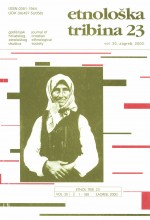Bernardo Kohnen (1876.-1939.)
Bernardo Kohnen (1876.-1939.)
Author(s): Koraljka Kuzman ŠlogarContributor(s): Sanja Kalapoš (Translator)
Subject(s): Cultural history, Customs / Folklore, Geography, Regional studies, Ethnohistory, Cultural Anthropology / Ethnology, 19th Century, Pre-WW I & WW I (1900 -1919), Interwar Period (1920 - 1939)
Published by: Hrvatsko etnološko društvo
Keywords: Kohnen - missionary; Africa; Sudan; Shilluk; culture;
Summary/Abstract: Holte in Hannover was the birthplace and the starting point of the life path of Bernardo Kohnen. He was born there in 1876. Having moved to Travnik in Bosnia with his parents, he left Germany as a child. He spent his childhood years in the Travnik area, attending school in a Jesuit institute. However, after the sixth grade he left for Verona and joined the order Figli del Sacro Cuore (F. S. C.), whose activities were concentrated in Africa. He took holy orders and became a priest in 1902. In the same year, he was sent to Sudan, to the mission among the Shilluk tribe. He was living and working there until 1933, when he was transferred to Rome due to his illness. He died on 21 st January 1939. During the thirty years of his living in the area of upper flow of the Nile river in the southern part of Sudan, he became an acclaimed expert on languages and cultures of the Nile tribes, especially on the Shilluk tribe, among whom he had spent the major part of his mission. Kohnen’s letters, stories and reports are interesting documents of his activities and the circumstances of the Nile tribes during the first half of the twentieth century. He found himself in a surroundings until then untouched by the European civilization and unchanged by European influences and thus was able to document legends, beliefs and songs that had been preserved merely as a part of oral tradition up to that point. He studied the origins, languages, customs and rituals, and was a witness to the characters and features of the tribes he was living with. For evaluation of his work it is very important to note that no traces of eurocentrism can be found in his writings, which makes both them and the materials they contain a reliable source. Today, they are a valuable source for studying history and culture of the Nilotic peoples, primarily the Shilluk, as well as a testimony to the changes caused by the spreading of the Christianity and the inflow of the European civilization. Besides being one of the first researchers into the south Sudan tribes, Kohnen was also the author of the first grammar books and dictionaries of the Shilluk language. He composed grammars in Italian and English, wrote Shilluk-Italian dictionary and translated parts of the Bible and some other books into the Shilluk language.
Journal: Etnološka tribina : Godišnjak Hrvatskog etnološkog društva
- Issue Year: 30/2000
- Issue No: 23
- Page Range: 93-104
- Page Count: 12
- Language: Croatian

